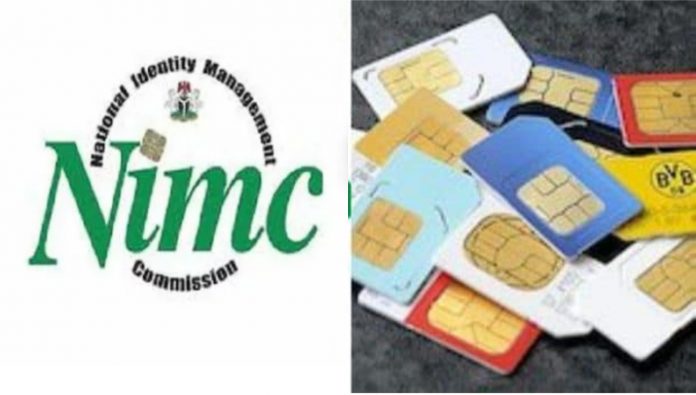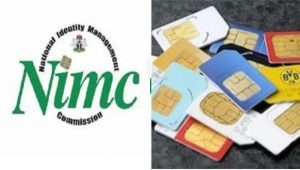NIN, SIM
By Adebayo Obajemu
The insecurity in various parts of the country has continued to worsen despite the Subscriber Identity Module (SIM) –National Identity Numbers (NIN) synchronization introduced on December 16, 2020 as a panacea to curb criminalities such as banditry and kidnappings.
The federal government had assured Nigerians that the SIM-NIN linkage would enable security agencies to track criminals.
Recall that former President Muhammadu Buhari had, on May 6, 2021, noted that the synchronisation of NINs nationwide was crucial to providing digital framework to combat insecurity.
Buhari, while launching the National Policy for the Promotion of Indigenous Content in Nigerian Telecoms Sector and Revised National Identity Policy for SIM Card Registration in Abuja at that time, had urged Nigerians to participate in the synchronisation exercise.
“The NIN will cover one of the weaknesses in our security structure. We will be able to easily identify and know the personality of Nigerians. We will identify people easily, including the crooks,” he had said.
Buhari pointed out that the project would support efforts to enhance security and develop the economy.
“NIN is the foundational digital ID for the country. Both Nigerian citizens and legal residents are expected to obtain the special number. It will provide access to government services and give government useful insights that would enable us to utilise scarce resources in a more efficient way,” the former president had assured.
However, more than three years after the SIM-NIN synchronisation was introduced, bandits and other criminals have abducted and killed thousands of persons in various parts of the country.
Almost in all cases, the criminals reached out via mobile telephone lines to victims’ families, who paid huge amounts of money as ransom.
National Waves’s investigations revealed that between December 16, 2020 and January this year, a total of 12,586 persons were kidnapped across states and the Federal Capital Territory (FCT)
In 2020 alone, 2,242 persons were reportedly abducted; 4,987 in 2021; 2,076 in 2022; 3,063 in 2023 and 206 so far this January. Within the period under review, bandits were reported to have killed a total of 10,012 persons across the country: 837 in 2020; 4,169 in 2021; 2,310 in 2022; 2,586 in 2023 and 110 in January 2024.
These are aside from the reported killings of 1,569 persons by Boko Haram insurgents in the North East within the period: 747 in 2020; 260 in 2021; 192 in 2022; 268 in 2023 and 12 so far in this month.
Findings by this medium showed that about 13 million of active SIM cards are yet to be linked to their owners’ NINs.
Sources at the National Identity Management Commission (NIMC), who spoke with National Waves put the total number of active voice subscribers in Nigeria at 221,769,883.
It is sad that nearly all government agencies in the country are bogged down in inefficiency. For many years, the Nigerian Communications Commission has tried to register citizens for the National Identity Number. At one point, it required the people to link their NIN to the Subscriber Identity Module. The linkage policy, too, has continued to run into difficulties. Initially, Nigerians failed to respond to such, and most times when it is too late they would begin to rush causing undue pressure on a system that is already fraught with challenges.
At NIN registration centre at Sango this reporter was among the crowds waiting to be attended to when the network suddenly broke down. Only seven people had been attended to among the crowds that nudged 53 in number.
Adeola Bisi, a trader told National Waves that she has been coming to the centre without success. ‘’Initially I went to the Ikeja office but the place was another hellhole. Only the people that have contacts high up or money have the hope of getting it done on the condition that there won’t be network issue.
Recall that following a series of aborted deadlines, the NIN-SIM linkage issue provoked another round of resentment recently outrage as telcos blocked SIMs not linked with the owners’ NINs just before the July 31 deadline mandated by the NCC. This caused serious confusion among the affected Nigerians, who lamented that the blockage disrupted their everyday activities, businesses, and lives. Angry phone subscribers laid siege to users telco customer care centres in many states, trying to reactivate their blocked lines, leading to frustration and protests. ‘’I was at Ikeja centre for four days without success in spite of the fact that I used to come there very early. It’s about whom you know, the crowds were always beyond what the centre could cope with. It is as if the government in order to punish Nigerians refused to decentralize the system. It should have been a case where in each neighbourhood we have up to five mini centres’’, Austen Nweke , a spare parts seller at Abule Egba told this medium.
Introduced in December 2022, the NIN-SIM linkage policy was part of the government’s effort to enshrine a Know-Your-Customer regime, to ensure that no mobile phone user is anonymous in Nigeria. This is to curb identity theft, kidnapping, cybercrime, and other criminal activities.
Before the NIN-SIM policy, kidnappers who had been on the rampage in the country demanded ransoms using unregistered SIMs.
The Inspector-General of Police, Kayode Egbetokun, in April, said 214 kidnappings and 141 terror cases, among other cases, were recorded in just eight weeks. Many of these kidnappings and attacks were planned with unregistered SIMs.
The NCC claims Nigeria loses $500 million annually to all forms of cybercrime, including hacking, identity theft, cyber terrorism, harassment, and Internet fraud. Hence, the government ordered the NIN-SIM verification, among other KYC schemes.
According to the National Identity Management Commission, 105 million Nigerians had enrolled for NIN as of April 2024.
In April 2022, following a directive from the NCC, over 72.77 million active mobile lines were barred. During that period, the country had 197.77 million active telecom lines.
The NCC issued a notice in December 2023 instructing telcos to bar SIMs not linked to their owners’ NINs by February 28, 2024. The deadline for the SIM-NIN linkage, earlier slated for April 15, was postponed to July 13, 2024.
While millions have successfully linked their SIMs to their NINs, many suddenly discovered that their SIMs have not been successfully registered.
MTN Nigeria had, in its first-quarter 2024 financial report, said 8.6 million lines had been barred.
Though Airtel, Glo, and 9mobile have yet to give a figure for barred lines, industry sources estimate that over 40 million lines may have been barred between February and April.
The NCC order that all blocked lines be restored following public outcry represents but a temporary respite.
The agencies involved and the telcos have failed to give Nigerians the confidence that things can be done properly. The NIN registration centres are crowded with registrants waiting for days and, sometimes, weeks to register for their NINs before even considering linking their SIMs.
Poor internet connectivity and epileptic power supplies are challenges bedevilling the registration centres.
Citizens are being punished for the government’s inefficiency and sometimes extorted before they can be registered.
Dr. Olufemi Omoyele said government should work hard to ensure a seamless linkage by addressing the issue of crowded centres, increase workers working on the linkage, mandate telcos to work on their poor connectivity and ask DISCOs to improve power supply at centres where linkages are being addresse


